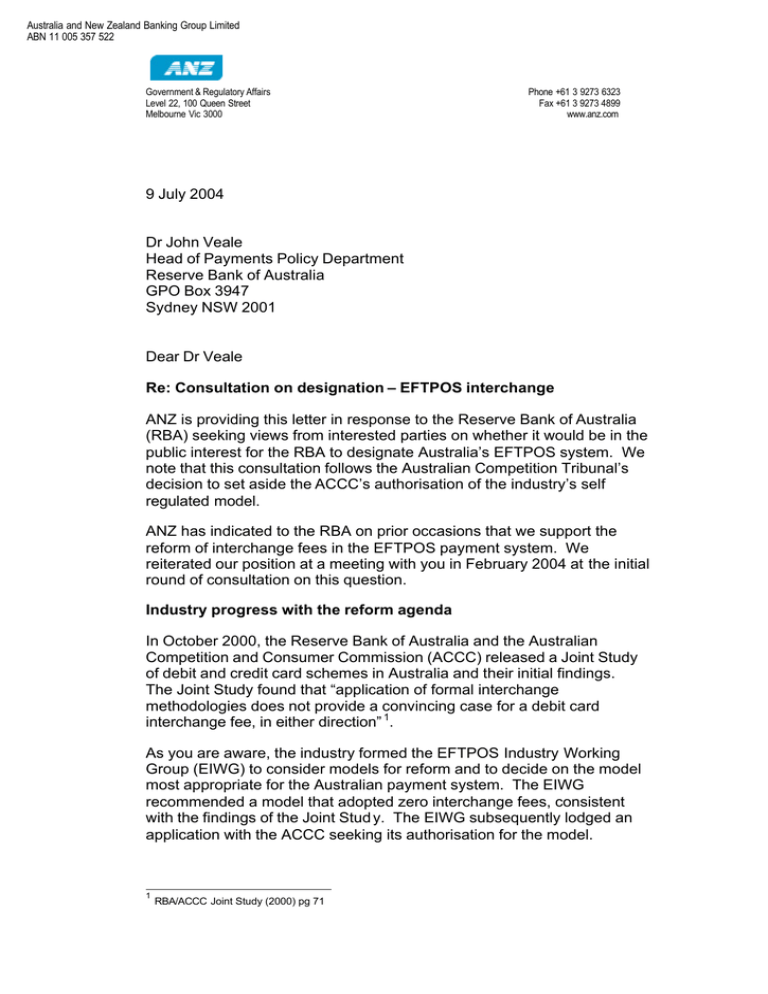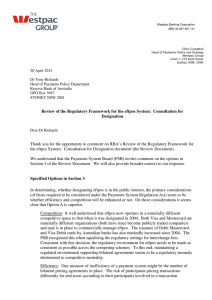Australia and New Zealand Banking Group Limited
advertisement

Australia and New Zealand Banking Group Limited ABN 11 005 357 522 Government & Regulatory Affairs Level 22, 100 Queen Street Melbourne Vic 3000 Phone +61 3 9273 6323 Fax +61 3 9273 4899 www.anz.com 9 July 2004 Dr John Veale Head of Payments Policy Department Reserve Bank of Australia GPO Box 3947 Sydney NSW 2001 Dear Dr Veale Re: Consultation on designation – EFTPOS interchange ANZ is providing this letter in response to the Reserve Bank of Australia (RBA) seeking views from interested parties on whether it would be in the public interest for the RBA to designate Australia’s EFTPOS system. We note that this consultation follows the Australian Competition Tribunal’s decision to set aside the ACCC’s authorisation of the industry’s self regulated model. ANZ has indicated to the RBA on prior occasions that we support the reform of interchange fees in the EFTPOS payment system. We reiterated our position at a meeting with you in February 2004 at the initial round of consultation on this question. Industry progress with the reform agenda In October 2000, the Reserve Bank of Australia and the Australian Competition and Consumer Commission (ACCC) released a Joint Study of debit and credit card schemes in Australia and their initial findings. The Joint Study found that “application of formal interchange methodologies does not provide a convincing case for a debit card interchange fee, in either direction” 1. As you are aware, the industry formed the EFTPOS Industry Working Group (EIWG) to consider models for reform and to decide on the model most appropriate for the Australian payment system. The EIWG recommended a model that adopted zero interchange fees, consistent with the findings of the Joint Stud y. The EIWG subsequently lodged an application with the ACCC seeking its authorisation for the model. 1 RBA/ACCC Joint Study (2000) pg 71 Delivering reform - zero interchange ANZ continues to support interchange fees for EFTPOS transactions being set to zero. Our position is based on the likely practical benefits of avoiding the costs of administering a system of regulated interchange fees. Any decision to set EFTPOS interchange fees to zero should be reviewed by the RBA, in consultation with the industry, in two to three years in light of industry developments. If there are no EFTPOS interchange fees: • there would be no need to set up a complex administrative and ? regulatory apparatus that would be required in the case of multilateral interchange fees; • there would be no need to determine whether interchange fees should be paid by issuers to acquirers, or vice versa; • there would be no need to determine whether different interchange fees would apply to different EFTPOS transactions; • there would be no disputes about which cost categories should be included in the determination of interchange fees; and • the complex task of measuring industry-wide costs would not be required. In ANZ’s view, these arguments are compelling, and point to a policy of setting interchange fees at zero. In terms of competition, setting interchange fees at zero would most likely result in a rebalancing by financial institutions of EFTPOS charges, in particular an increase in merchant fees charged by acquirers (since acquirers would no longer receive interchange fees). The extent to which merchant charges would increase would be limited by competition in acquiring. Competition in acquiring services is already strong and there are, in any case, no barriers to entry to the industry — even for small players who can negotiate access through gateway arrangements. Likewise, competition by issuers is also strong. EFTPOS interchange fees set at zero will not affect the existing strong competition for EFTPOS services to merchants and cardholders. Competition will in turn ensure tha t EFTPOS services are efficiently provided, as long as there are no regulatory barriers to cost recovery at both ends of the market (and none has been proposed). ANZ submits that a policy of no interchange fees would be best implemented if interchange fees for EFTPOS were set at zero, rather than explicitly abolished. This is because, at some time in the future, there might be a good reason for non-zero EFTPOS interchange fees. 2 We would emphasise that EFTPOS access and switching fees are conceptually disti nct from interchange fees and there is no need to regulate them, as the markets for gateway services and switching services are competitive. There is no inconsistency between having interchange fees set at zero for EFTPOS transactions co-existing with positive interchange fees for credit card transactions. The large imbalance in the costs of credit card issuers and acquirers means that credit card interchange fees are required to support the existence of the credit card network. Without such interchange fees, credit card networks could not exist. Public benefits of reform The proposed reform will be likely to result in a number of benefits to the public, including: (i) (ii) (iii) making EFTPOS more attractive to consumers relative to other means of payment, particularly credit cards, thereby inducing a shift towards the use of EFTPOS and reducing the overall cost of the Australian payments system; introducing greater flexibility into the setting of EFTPOS interchange fees, reducing the inertia that has made them unresponsive to changes in market circumstances, and providing an explicit mechanism for reviewing interchange fees ; and making entry as a new issuer or acquirer of EFTPOS transactions easier by simplifying the negotiation of bilateral interchange agreements. A discussion of these points follows. Relative pricing Currently, issuers pay an interchange fee to an acquirer in respect of each EFTPOS transaction. Under the proposed zero EFTPOS fee regime, the issuer would not pay any sum by way of an interchange fee to an acquirer, thereby reducing the issuer’s costs of each EFTPOS transaction. Effective competition between issuers in the retail banking market is likely to lead to those cost reductions being passed on to cardholders. Acquirers are likely to increase merchant service charges so as to replace the income stream previously provided by interchange fees. Competition in retailing is likely to see merchants, in the vast majority of cases, recover their higher costs through a general (although inconsequential) rise in the price of goods and services, rather than through surcharges for the use of EFTPOS. The proposed reform is therefore likely to mean consumers face a lower relative cost of using EFTPOS compared with other means of payment. 3 This is likely to lead to substitution by consumers towards use of debit cards and away from credit cards in their payment for goods or services. As argued by the RBA, this will give rise to public benefits through improvements in the efficiency of the payments system as a whole. Note that if, instead, merchants responded to increased merchant service charges by imposing surcharges, customers using EFTPOS would find the reduced cost of cardholder services offset by the higher price they were paying for goods and services. However, the ubiquity and attractiveness of EFTPOS to customers and merchants makes this a highly unlikely reaction on the part of merchants. In any event, if a merchant were to impose a surcharge on EFTPOS transactions, the merchant would also be likely to impose a (higher) surcharge on credit card transactions. In those circumstances, the proposed reform would still be likely to lead to a net increase in consumers’ use of EFTPOS. The outcome would be in line with the conclusions of the RBA/ACCC Joint Study that it could “not see a continued need for an interchange fee in the debit card network”2. The EFTPOS reform would work together with the reforms to credit card interchange fees that took effect from 31 October 2003, which as expected by the RBA have had the effect of increasing the cost of credit card use to consumers. Some EFTPOS stakeholders have suggested that there should be a staged transition from current interchange fees to zero rates rather than a single step. A single step to zero has a number of merits over transition. In particular: • the public benefits associated with lowering the relative cost to consumers of using EFTPOS would be delayed by a transition to lower interchange fees, so the discounted value of the public benefits of the reforms wo uld be reduced; and • there are likely to be adjustment costs associated with changing or renegotiating charges and agreements in downstream markets in response to the proposed reforms that, although not necessarily increased in proportion to the number of steps of transition, would be minimised by a single adjustment. Flexibility in setting EFTPOS interchange fees One of the problems with the current arrangements, whereby interchange fees are set as part of the bilateral agreements between issuers and acquirers, is that the difficulty of renegotiating those agreements creates an inertia that discourages any review and change in the interchange 2 RBA/ACCC Joint Study (2000) Page 71 4 fees, despite changes over the years in market circumstances such as costs. The capacity of financial institutions to finance system-wide expansion or improvements in the EFTPOS network may be constrained by the loss of interchange fee revenues. It may be possible for individual financial institutions to initiate efficient network improvements financed through increased debit card transaction charges and merchant service charges. System-wide initiatives would, however, be difficult to coordinate in the absence of all network principals increasing fees and charges for EFTPOS-related banking services. Under the proposed arrangements, on the other hand, system-wide change could be negotiated far more easily through an appropriately set non-zero interchange fee than if all existing bilateral agreements had to be renegotiated to fund the improvement. This constitutes a public benefit as a response to the findings of the RBA/ACCC Joint Study that competitive pressures have not been sufficiently strong to bring interchange fees into line with costs. We would also suggest that a review be conducted of the level of the interchange fee after three years, or earlier if there was a material change in circumstances. The flexibility to review interchange fees at an earlier point in time is considered to be a sensible precaution against unforeseen consequences of the proposed reduction in the current interchange fees to zero, and also a safeguard against what could otherwise be an inability to fund large investments in the EFTPOS network, e.g. to accommodate and implement major technological change. For example, the introduction of higher security on transactions or greater functionality of cards might require large capital investments in new equipment by issuers, acquirers and possibly some merchants. Access ANZ acknowledges that the reform to EFTPOS access is an important public policy issue. We are strongly of the view that the appropriate mechanism through which to address EFTPOS access reform is within the regulations and Manual of the Consumer Electronic Clearing System administered by the Australian Payments Clearing Association (APCA). APCA has commenced work on developing an appropriate access framework including establishing a working group to develop the reform framework. ANZ supports the process of developing practicable and equitable access rules through APCA and we submit that this process should be allowed to continue in parallel with any decision the RBA may take on how to advance the reform program overall. 5 Easier entry as an issuer or acquirer The adoption of multilateral interchange fee setting under the proposed arrangements would ameliorate the extent of natural barriers to direct entry into the EFTPOS market. Bilateral agreements should be easier to negotiate as, to the extent they remain following the APCA access work (as currently envisaged), an element of the negotiations would be removed. This would make direct entry – as a network principal - to the EFTPOS system easier for both potential new issuers and acquirers because no negotiation would be required on the level of the interchange fees. Conclusion On balance, for the purposes of the RBA’s current reform program, ANZ believes that EFTPOS interchange fees should be set at zero, at least at the present time, given the alternative of multilateral interchange fees, which would most likely be small anyway. However, advances in payments technologies and other innovations mean that, in the future, interchange fees for EFTPOS transactions might be justified. ANZ recommends that the issue be revisited in two to three years time in light of such developments. The Australian Competition Tribunal’s decision to set aside the ACCC authorisation to set interchange fees to zero has set back the reform agenda. ANZ appreciates that there is now a need to put some certainty of outcome around EFTPOS reform. We look forward to an opportunity to discuss these issues in more detail with you. Yours sincerely Jane Nash Head of Government and Regulatory Affairs 6

